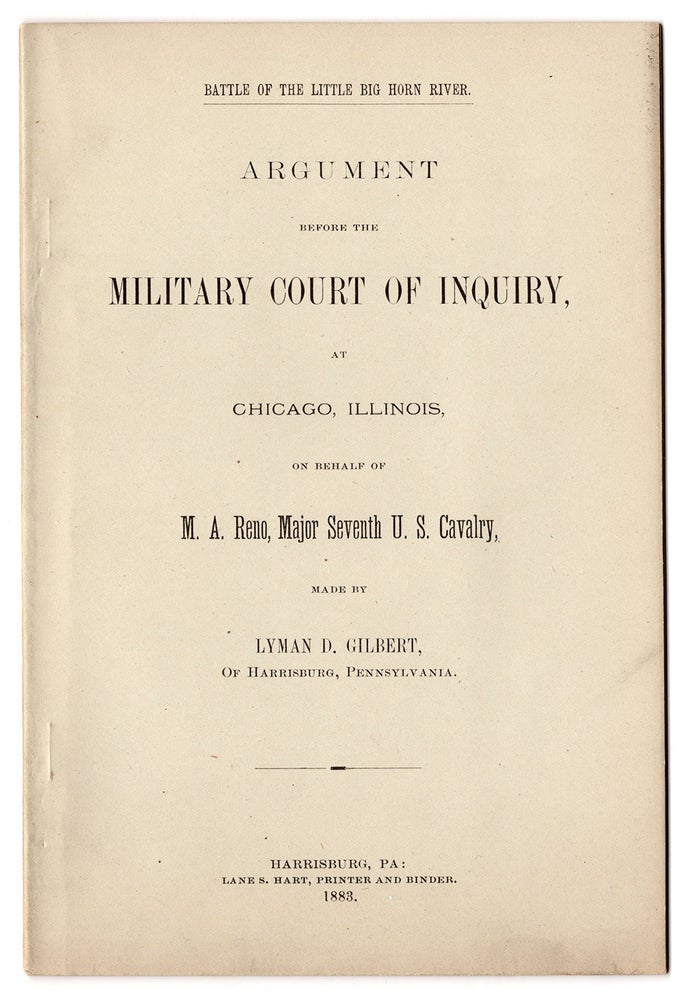Battle of the Little Big Horn River. Argument Before the Military Court of Inquiry, at Chicago Illinois, on Behalf of M. A. Reno, Major Seventh U. S. Cavalry, Made by Lyman Gilbert
Harrisburg, Pennsylvania, Lane S. Hart, 1883. 8vo (8.25” x 5.5”), printed light gray wrappers. 31 pp. A rare pamphlet printing of the concluding speech of attorney Lyman Gilbert at the 1879 Court of Inquiry convened to examine the actions of Maj. Marcus A. Reno at the Battle of the Little Bighorn. Reno (1834–1889) served as a Brig.-General in the U.S. Army during the Civil War, but returned to the rank of Major when the war ended. In June 1876, he took part in the Battle of the Little Big Horn, which resulted in the massacre of nearly sixty percent of Custer’s 7th Cavalry. Although Reno was the senior surviving officer and was credited with saving the remainder of the Cavalry in the battle, he was soon accused of dereliction of duty and cowardice by individuals within and outside the army. It was argued that Reno, who was in charge of three of the 7th’s twelve companies of men, had failed to support Custer on the battlefield by remaining in a defensive formation with his troops some four miles away. After being attacked in the press, called a coward, and saddled with the responsibility for Custer’s death (even by Custer’s widow), Reno requested an inquiry to officially clear his name. The Court of Inquiry convened in Chicago in early 1879, and lasted a month. Defending Reno’s actions, Harrisburg Pennsylvania lawyer Lyman D. Gilbert begins his speech by noting that the inquiry seeks not personal victory but rather the establishment of truth. He observes that the charges against Reno rest largely on the testimony of two mule-packers, a doctor, an Indian scout, a sergeant and an Indian interpreter—and then proceeds to dispel these charges. Among the matters Gilbert addresses are: the question of whether Colonel Benteen could have united with Reno in the timber before the retreat; what the conditions were of the horses and men on the morning of the battle; the slaughter of the horses and mules inside Reno’s defense lines; the command’s confusion and irritation over Custer’s whereabouts; whether Reno was drunk, and so forth. Gilbert concludes by pointing out that “even the privates and non-commissioned officers, on what was almost the field of battle, with one voice commend [Reno] and his brother officers for promotion for soldierly bravery. And the general of the army receives with approbation their high praise of his conduct.” On 10 Feb. 1879, after extensive interrogation of the officers and civilians present at the battle, the court concluded the following: “while subordinates in some instances did more for the safety of the command by brilliant displays of courage than did Major Reno, there is nothing in his conduct which required [adverse criticism] from the Court.” Although Reno was cleared of the charges, he was later tried on an unrelated charge of behavior unbecoming an officer and was court-martialed. In 1967, long after Reno’s death, the case was reopened and his name was cleared. OCLC locates just one copy, at the U.S. Army War College. A rare pamphlet reckoning with the fallout from the Battle of the Little Bighorn. REFERENCES: Lyman D. Gilbert defended U.S. Army Major Marcus Reno (2011) at nssh.com; Major Marcus Reno (2019) at nps.gov; Major Reno’s Day in Court (2018) at bigbytebooks.com. CONDITION: Very good, light wear and toning.
Item #6564
Sold


